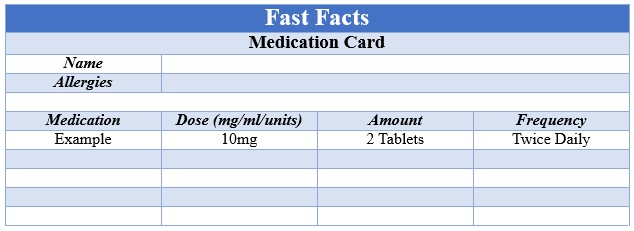How well do you know them?
You take your medications every day just as your doctor prescribed, but do you know what they are supposed to be helping your body do? Do you know side effects that you should be looking for? Are there interactions between your medications that you should be aware of? All of these are important to know about every medication you take. Most of us believe that if a doctor prescribes a medication, we need to take it. While this is likely true, if you have different doctors for different conditions, it is very easy to have multiple medications that could potentially interact with each other. It is important to know what you’re taking and why.
.jpg) Definition
Definition
Polypharmacy is the term used to describe when someone is taking an amount of medications that puts them at an increased risk for drug interactions or they are taking more medications than they need. If you take more than five medications, you are at increased risk for having a drug interaction. A drug interaction is when two medications work together and this can have an intended (positive) or unintended (negative) impact on your body.
What Do You Need to Know?
For each medication you are taking, it is important to know several things. Besides the name, it is important to be familiar with the dosage. This is not only the milligrams (mg) or milliliters (ml), but number of tablets you are taking each dose and how many times a day you are taking them. It is essential to know how the medication is supposed to work and what symptoms you should be looking for to confirm this. It is equally important to know what side effects you could experience and what symptoms those could cause. Ask your doctor about whether or not you need to take the medication with food and how long you are going to be taking the medication. It is vital to ask if there are any restrictions you need to follow while taking the medication and if you need any following up testing, such as blood work.
What Should You Do?
In addition to knowing your medications, there are several things that you can do in order to ensure you take them correctly and safely. Keep the medications in the bottle they came in from the pharmacy and do not mix them together. If you do use a weekly dosage container, make sure that you keep the bottles in an easy to locate area. Set a routine to take your medications so you don’t forget to take them. Put your medications near where you need to take them, such as in the bathroom if you take it when you first wake up or if you take the medicine with food, keep it in the kitchen. Use the same pharmacy to fill all of your prescriptions as this will help decrease the likelihood that you take a medicine might negatively interact with another. Make a medication card and update it regularly. For information about what should be included on a medication card, please see Fast Facts.
If you have any questions regarding your medications, you should talk to your doctor or pharmacist. By following the steps and being well informed, you will be able to take your medications safely and decrease the chance of you having a negative medication interaction.